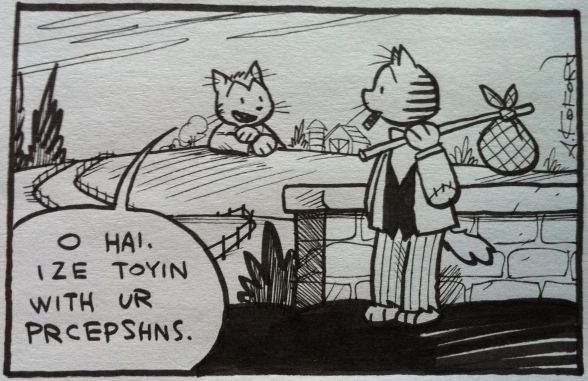Writing Movies for Fun and Profit: How We Made a Billion Dollars at the Box Office and You Can, Too!, Garant & Lennon. Non-Fiction. This is a ruthlessly practical guide to selling screenplays to Hollywood studios. It also provides appalling and entertaining insight into what is required of a writer in order to make a living doing that. If you are at all interested in the business of writing Hollywood studio movies, I encourage you to read this book. Even if you’re not, it’s probably worth a look.
Category Archives: Craig’s Book Reviews
Writing Movies for
Invisible Things Review
Invisible Things, Davidson. Yes. Follows The Explosionist. Picks up near where its predecessor left off, and is another just fine YA novel. This one is more openly setting up for a follow-up book, which, if history is any guide, should be showing up in a year or so.
Fat Vampire Review
Fat Vampire: A Never Coming of Age Story, Rex. No. This came highly recommended, and has plenty of positive traits (two in particular: it’s mechanically sound, an incorrect “whomever” notwithstanding; and it has largely believable characterization), but it has two (to me) fatal flaws: it has way too much explanation, and it strikes me as far too interested in amassing geek credibility. These two characteristics combine particularly gratingly in the Rocky Horror scene, which walks us torturously through nearly every nuance of the viewing experience. Granted, plenty of plot and character advancement is occurring during the sequence, but I have to believe every bit of it could have been accomplished better without the artificial framework imposed by having it happen at a night out at a movie—especially when the author feels it necessary to explain so much of the night out.
This book would have been much better if Rex had worked harder on not telling us so much.
Explosionist Review
The Explosionist, Davidson. Yes. There were a number of features of this book that annoyed me: it’s nearly tiresome in the same ways that Jo Walton’s “Small Change” series was nearly tiresome (it is conceptually similar to Walton’s work, too); I discovered that I do not much care for the taint of outright fantasy in my historical speculative fiction; and there was this:
Dismissed, Sophie slipped upstairs just in time to avoid the inevitable awkward encounter with Miss Gillespie in the hall.
On the other hand, that sentence was the only time Davidson’s writing pulled me completely out of the story, and I found the characters believable enough, and some moments were quite well executed.
Fuzzy Sapiens Review
Fuzzy Sapiens (Note: link is to single-volume release of Little Fuzzy and Fuzzy Sapiens (then titled The Other Human Race)), Piper. Yes. I read this as part of my ongoing quest to understand why the Fuzzy universe got rebooted, and in this sequel to Little Fuzzy, I am finally seeing why it might be desirable to leave large chunks of this canon behind. I wouldn’t presume to speculate that the things I would leave behind are the same ones that Scalzi will, but I will say that the constant and universal smoking is among the least jarring of things I would pretend never happened.
Mort Review
Mort, Pratchett. Yes. Another enjoyable Discworld® novel.
Little Fuzzy Review
Little Fuzzy, Piper. Yes. I read this mostly to find out whether there was anything about it that seemed to cry out for re-imagining. To cut to the chase, I didn’t find anything. It is very much of its time, and very reminiscent to me of Heinlein in its gender and other politics, so it is a bit quaint; but I found nothing that made me understand any better the impulse to dig up these bones and throw modern flesh over them
Alison Wonderland Review
Alison Wonderland, Smith. No. There was nothing egregiously objectionable in Smith’s writing, but there was no point throughout reading the book that I would have been unable to put it down. I found it difficult to care about any of the characters, and the intrigue just wasn’t very intriguing.
Note: This review is based on an advance reader’s copy provided by the publisher.
Tiassa Review
Tiassa, Brust. Yes. I give Brust full credit for mixing things up with his Vlad Taltos books: in this one, in addition to the usual narrative voice of our hero, we get traditional third-person as well as a visit from Paarfi, the Dumasian voice of the Khaavren romances. That said, it is overwhelmingly likely you already know whether you want to read this one. If you don’t, I recommend you start with Jhereg (linked book actually includes the first three novels).
Jane Jones Review
Jane Jones: Worst. Vampire. Ever., St. Onge. Yes. I must confess to a small amount of trepidation regarding this book, since it was written by an Internet acquaintance of whom I am fond, and I didn’t want to be in the position of saying unpleasant things about it. Fortunately (and not at all surprisingly, given that I knew from her blog the author is a skilled writer), I quite enjoyed it. St. Onge has built a pleasingly rich story around the simplest of high concepts (“blood-intolerant teenage vampire”). An excellent novel and, what is more, an excellent YA novel.
Editing was better than most recent releases, though not without a couple hiccups.
